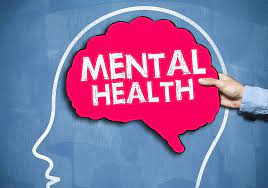How to Prioritize Mental Health in a Fast-Paced World

Strong 8k brings an ultra-HD IPTV experience to your living room and your pocket.
In today's fast-paced world, where work deadlines, social obligations, and digital distractions compete for our attention, prioritizing mental health has never been more critical. Amidst the constant hustle, it's easy to neglect emotional well-being — yet doing so can lead to burnout, anxiety, depression, and a diminished quality of life.
In this article, we explore practical strategies for making mental health a priority without compromising productivity or personal goals. Whether you’re a busy professional, student, parent, or entrepreneur, these tips can help you protect your peace and thrive in a demanding world.
Why Mental Health Should Be a Priority
Mental health is the foundation of our ability to function in daily life. It affects how we think, feel, and behave, and it shapes our relationships, career performance, and physical health. When we neglect mental health, we’re more susceptible to stress-related illnesses, decision fatigue, sleep disturbances, and reduced resilience.
In a culture that often glorifies being "busy," pausing to take care of your mind can feel like a luxury. But the truth is, prioritizing mental wellness is not just self-care — it's essential.
Signs That Your Mental Health Needs Attention
It’s important to recognize the signs that your mental health may be suffering. Some of these signs include:
- Persistent feelings of sadness or hopelessness
- Irritability or mood swings
- Difficulty concentrating or making decisions
- Feeling overwhelmed by daily tasks
- Withdrawal from friends and family
- Changes in appetite or sleep patterns
- Physical symptoms like headaches or fatigue
If you notice any of these indicators, it's time to take proactive steps toward better mental health.
1. Set Healthy Boundaries
One of the most effective ways to support your mental health in a fast-paced world is by setting clear boundaries. This includes:
- Work boundaries: Avoid checking emails after hours or taking on more work than you can handle.
- Social boundaries: Say no to events or people that drain your energy.
- Digital boundaries: Limit screen time, especially on social media, which can impact self-esteem and mental clarity.
When you set boundaries, you create space to recharge and reduce stress.
2. Practice Mindfulness Daily
Mindfulness is a powerful tool for protecting your mental health. It involves paying attention to the present moment without judgment. Practicing mindfulness can help:
- Reduce anxiety and depression
- Improve emotional regulation
- Enhance focus and clarity
You can incorporate mindfulness into your daily routine through meditation, deep breathing, or even mindful walking. Apps like Headspace or Calm can provide guided practices to get started.
3. Make Time for Physical Activity
Regular physical activity has a profound effect on mental health. Exercise releases endorphins — the body's natural mood boosters — and helps reduce stress hormones like cortisol.
You don't need to hit the gym for hours. A 30-minute walk, a short yoga session, or even dancing in your living room can significantly improve your mood and mental state.
4. Prioritize Sleep
Lack of sleep is one of the most common but overlooked factors affecting mental health. Sleep deprivation can lead to:
- Increased irritability and stress
- Impaired cognitive function
- Higher risk of anxiety and depression
Aim for 7–9 hours of sleep each night. Create a calming bedtime routine, avoid screens an hour before bed, and keep your sleep environment cool and quiet.
5. Stay Connected to Others
Human connection is vital for good mental health. In a fast-paced world, it's easy to become isolated or let relationships slide. Make time to connect with:
- Family and friends
- Support groups or communities
- Therapists or counselors when needed
Whether it’s a phone call, a quick coffee meetup, or attending a group activity, connection reduces feelings of loneliness and strengthens emotional resilience.
6. Nourish Your Body and Mind
A balanced diet plays a significant role in supporting mental health. Nutrient-rich foods can positively impact brain function and mood. Consider:
- Eating more whole foods, fruits, vegetables, and lean proteins
- Reducing intake of sugar, processed foods, and caffeine
- Staying hydrated throughout the day
Additionally, mental nourishment matters. Engage your mind with books, puzzles, creative hobbies, or journaling to keep your thoughts positive and focused.
7. Seek Professional Help When Needed
There’s no shame in asking for help. If you’re struggling, a licensed mental health professional can provide tools, support, and insight tailored to your needs.
Common therapy options include:
- Cognitive Behavioral Therapy (CBT)
- Talk therapy
- Online counseling and telehealth mental health services
Seeking help early can prevent more serious issues and promote long-term wellness.
8. Embrace the Power of Saying “No”
In a culture that rewards productivity, saying “yes” to everything may feel necessary — but it’s also a fast track to burnout. Protect your mental health by:
- Learning to say “no” without guilt
- Prioritizing activities that align with your values
- Delegating tasks when possible
Your time and energy are valuable — use them wisely.
9. Take Breaks and Unplug
Even short breaks during the day can help you reset mentally. Use techniques like the Pomodoro Method (25 minutes of work followed by a 5-minute break) to stay fresh and focused.
Also, consider regular digital detoxes to reduce overstimulation from emails, notifications, and social media — all of which can increase stress and anxiety.
10. Cultivate a Positive Mindset
While you can't control every situation, you can control how you respond. A positive mindset helps build resilience and improves your mental health.
Try these practices:
- Daily gratitude journaling
- Affirmations or positive self-talk
- Focusing on solutions instead of problems
The more you train your mind to focus on the good, the stronger your mental resilience becomes.
Final Thoughts
In a world that moves at lightning speed, it's easy to overlook the importance of mental health. But taking care of your mind is not a luxury — it’s a necessity. By implementing small yet powerful habits into your daily routine, you can protect your well-being, improve your quality of life, and handle life's challenges with greater ease.
Prioritizing mental health isn't about withdrawing from the world; it's about learning to move through it with clarity, balance, and strength.
Note: IndiBlogHub features both user-submitted and editorial content. We do not verify third-party contributions. Read our Disclaimer and Privacy Policyfor details.



